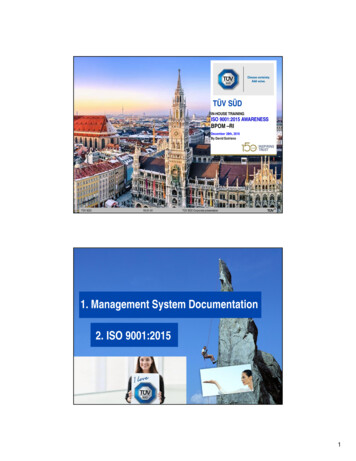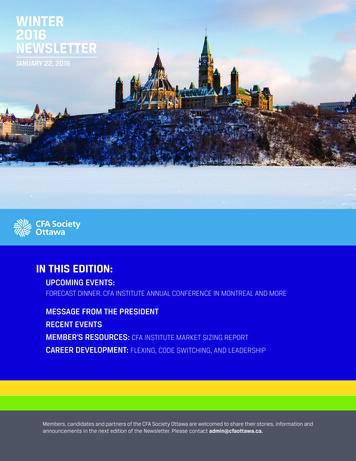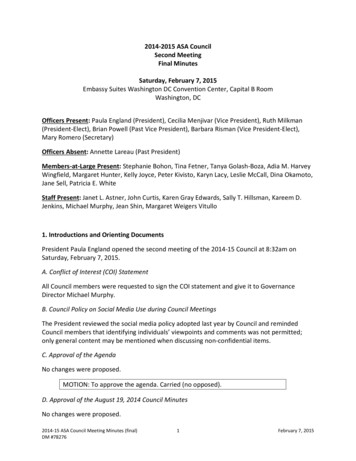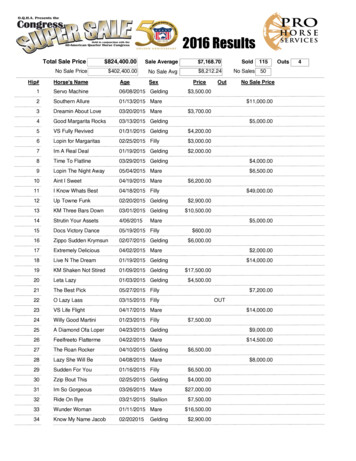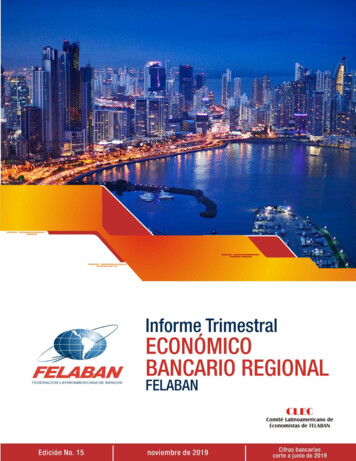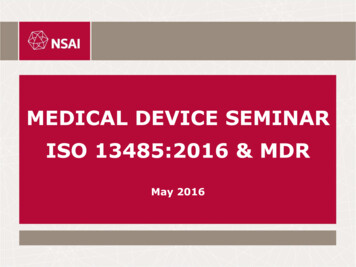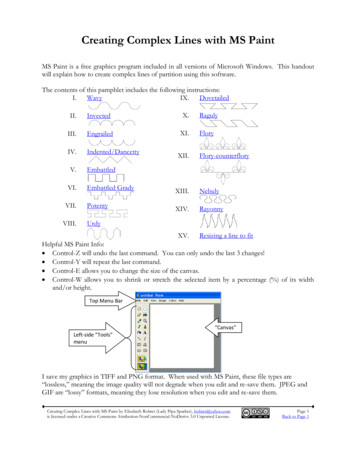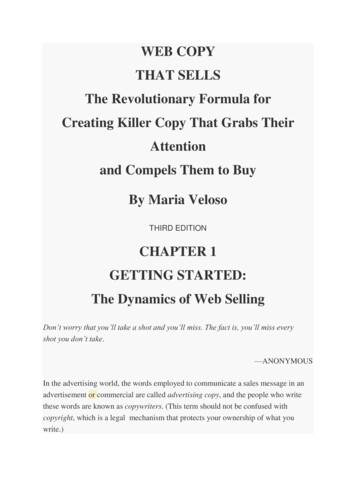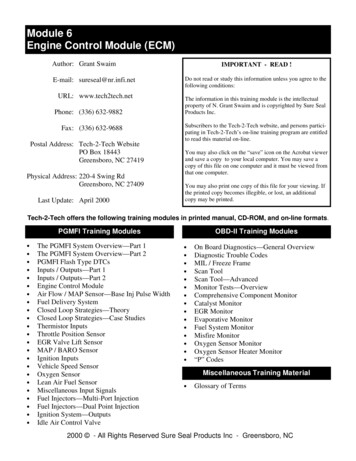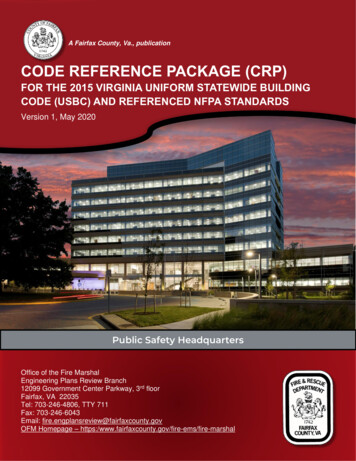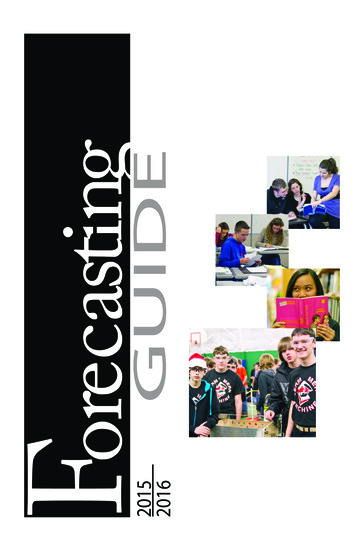
Transcription
20152016GUIDEForecasting
CAMAS HIGH SCHOOL“Rigor, Relevance & Relationships”CAMAS HIGH SCHOOL FORECASTING GUIDECOURSE DESCRIPTION CONTENTSGRADUATION REQUIREMENTS .1COLLEGE ADMISSIONS . 2GRADUATION PLANS . 3ADVANCED PLACEMENT CLASSES.4DESCRIPTION OF COURSES:BUSINESS & MARKETING . 6FAMILY & CONSUMER SCIENCE . 9FINE ARTS: VISUAL & PERFORMING . 11FRESHMAN ACADEMY.15INTEGRATED ARTS & ACADEMICS (IAA) . 16LANGUAGE ARTS & SOCIAL STUDIES . 17MAGNET PROGRAM MATH, SCIENCE & TECHNOLOGY . 22MATHEMATICS . 25PHYSICAL EDUCATION . 28POTPOURRI . 29SCIENCE . 30SPECIAL EDUCATION . 33TECHNOLOGY EDUCATION . 36WORLD LANGUAGES. 40VOCATIONAL OFF-CAMPUS . 42GENERAL INFORMATION . 43
GRADUATION REQUIREMENTS FORCAMAS HIGH SCHOOL1.2.3.4.5.6.7.Earn a minimum of 22 credits accumulated in grades 9 through 12Pass all required classes (listed below)Attend a minimum of eight semesters of high school (an exception: Exchangeprogram)Complete and pass the Senior ProjectBe enrolled in six CHS classes during the school day (exceptions: Running Start& Skills Center)Develop an educational plan that includes two years beyond high schoolMeet the established standards of any Washington State mandated test requiredfor graduationStudent classification by credit definition:Freshman (9th grade)Successful completion of 8th gradeSophomore (10th grade)5 credits with at least .5 in English 9 or 4.0 credits with 1.0 in EnglishJunior (11th grade)10 credits with at least 1.5 in English or 9.0 credits with 2.0 in EnglishSenior (12th grade)16 Credits with at least 2.5 in English or 15.0 credits with 3.0 in EnglishREQUIRED CLASSES AND CREDITSGraduation year 2015 and Beyond 4 Washington State History (In grade 7)English 91.0 creditEnglish 101.0 creditWorld History (10)1.0 creditEnglish 111.0 creditUS History (11)1.0 creditEnglish 121.0 creditContemp. World Issues (12) 1.0 creditLaboratory Science2.0 creditsMathematics *3.0 creditsPE & Health2.0 creditsOccupational Education 1.0 creditVisual / Performing Arts1.0 creditElectives6.0 credits English 12 & Contemporary World Issues can be taken as Business Communications or AP Economics canbe taken as CWI during the senior year only Occupational Education Freshman Focus & .5 credit in another occupational elective*4 Mathematics must include: Algebra I, Geometry, & Algebra II or an Alternative Class1
COLLEGE ADMISSIONSStudents planning to attend a four year college or university need to consult college catalogues in theCareer Centre, counselors, check the college website or contact the institution directly. The requirementsgiven below are for Washington State public four-year college/university freshman admission. English – 4.0 credits – Pre-AP and AP level English classes are highly recommended Mathematics – 3.0 credits – Algebra I, Geometry and Algebra II are required/higher levels are strongly recommended Social Studies – 3.0 credits – A minimum of three years of Social Studies is required/AP level recommended Science – 2.0 credits (3.0 recommended) – Biology, Chemistry or Physics are suggested, AP highly recommended Foreign Language – 2.0 credits – Two years of one language – additional years highly recommended Fine, Visual or Performing Arts – 1.0 credit – Acceptable classes for Art credit are listed in this guide Additional requirement for entry into Washington State four year colleges: Students must take either Mathor Algebra based Science during their Senior year.We offer the following Advanced Placement (AP) classes - College bound students are encouraged totake advantage of these classes and perhaps gain college credit through AP exams. Classes are offeredbased on student forecasting numbers.Pre-AP English 9Pre-AP English 10AP English Comp 11AP English Lit 12AP BiologyAP ChemistryPre-AP Science 9AP PhysicsAP Calculus ABAP StatisticsAP Studio ArtAP SpanishAP Calculus BCAP World HistoryAP US HistoryAP Gov’t & Politics 12AP PsychologyAP Human GeographyAP Environmental Science AP EconomicsAP Digital PhotographyAP Computer SciencePP.S.A.T. Junior year (given only once in mid-October) – Good practice for the S.A.T. and toqualify for National Merit Scholarships. Freshmen and Sophomores may also take the testfor practicePS.A.T. or A.C.T. Junior year or early Senior year – ( Tests offered many times during the year).Either test accepted for college admissionPFASFA Senior year – In December, the Career Centre makes available Federal Aid forms thatare used to qualify students for grants and loans. Colleges also use this information for distributionof financial aid and special scholarships; students apply on line: www.fasfa.ed.gov on or afterJanuary 1.PCollege Admission – Senior year – Most students use the web for entering or printing theiradmission forms, transcripts, and other information is available in the 11/12 Administration/Counseling office.PN.C.A.A. Senior year – Student athletes need to apply to the NCAA Clearinghouse to qualify forparticipation in college athletics. The Athletic Director’s office has more information.2
HIGH SCHOOL GRADUATION PLANCOLLEGE PREP GRADUATION PLANFor entry into 2-year college or voc/tech schoolElectives vary according to student careerinterest. Students are encouraged to pursue aMajor area & take more than the required math& science classes.For direct entry into 4-year college/universityAP and Pre-AP are not necessary for entry butrepresent the most rigorous program available.Students are encouraged to pursue a Majorarea.English 9Freshman FocusPhysical ScienceFreshman PE & Health**Math*Elective9th10th11th12th9thEnglish 10World HistoryBiology**Math*Elective*ElectiveEnglish 9 or Pre-AP English 9Freshman FocusPhysical Science (Pre-AP Phys Sci)Freshman PE & HealthMath (Algebra I or above)*ElectivePre-AP English 10 ( or English 10)10thAP World History (or World History)AP Biology, BiologyMath (Geometry or above)*Elective*ElectiveEnglish 11US History11th**Math*Elective*Elective*ElectiveAP English 11 or English 11AP US History or US HistoryForeign/World Lang II (or III if begun in 9th)Math (Algebra II or above)Science ( Chemistry, Physics or AP level)*ElectiveEnglish 12 (or Bus Comm)CWI (or Bus Comm)12th*Elective*Elective*Elective*ElectiveAP Literature 12, English 12(or BusComm) AP CWI (or Bus Comm)Math (4-year colleges required orScience (Algebra based science)*Elective (Foreign/World Lang III orIV if offered)*Elective**must pass Alg. I, Geom, & Alg. II or CareermathClasses in bold are graduation requirementsClasses in bold are graduation requirements* To fulfill graduation requirements, all students must include in their Elective choices the following:A Fine Art classAn Occupational classA PE Elective credit class1.0 credit.50 credit (for a total of 1 credit)1.0 credit(An application process is necessary for a .50 PE Waiver and there is no guarantee that thewaiver will be granted)Students who enter the Magnet Math, Science & Technology Program will follow adiffererent course schedule during their 9th and 10th grade years and will fulfill aCollege Prep Graduation plan.3
ADVANCED PLACEMENT CLASSESADVANCED PLACEMENT CLASSESCHS offers advanced placement classes that are certified by the College Board. Through college-levelAP (Advanced Placement) courses, you enter a universe of knowledge that might otherwise remainunexplored in high school; through AP Exams, you have the opportunity to earn credit or advancedstanding at most of the nation’s college and universities. CHS currently offers AP courses in Studio Art,English Language, English Literature, US History, US Government/Politics, Spanish, Human Geography,World History, Calculus, Biology, Chemistry, and Physics. AP courses are available for 9th through 12thgrade students. The only requirements are a strong curiosity about the subject you plan to study and awillingness to work hard. Just a few reasons to sign up: Gain the edge in college preparation, Stand outin the college admissions process, and Broaden your intellectual horizons.Students are required to submit and sign an AP course contract/application.Pre-AP classes are offered at CHS to 9th and 10th graders in the subject areas of English and Science.Students are not required to take and pass Pre-AP classes in order to enroll in AP courses. Pre-APclasses are challenging and require students to be willing and able to work hard.What is special about AP? Skills developed in AP classes thoroughly prepare students for college courses Discussions are challenging, engaging, probing and intellectual AP students are taught to be critical and discriminating readers and thinkers. Teaching students toevaluate and interpret challenging primary source texts is a crucial AP component AP classes teach students to analyze, interpret, reason, and understand their subject frommultiple perspectivesWhat are the benefits of taking AP? AP classes are highly regarded by universities and college admission officers AP success is directly correlated to success at the university level. Students who succeed in APgenerally excel at the university level AP prepares students for the rigors of college. Many students feel confident and ready to entercollege after AP; many say college is easier Many CHS AP teachers give students who score a 4 or 5 on the test and have no missingassignments a grade bump in the course Starting with the class of 2012, AP grades at CHS are factored in the class rank calculation on afive point scaleWho is appropriate for AP? AP is open to any student from any background AP is not necessarily right for everyone Students must be disciplined, curious, and have a strong desire to work hard and learn AP is for students who want to learn along side other dedicated classmates in a challenging andrigorous environment AP is for students who love to learnADVANCED PLACEMENT CLASSES AND CLASS RANKCHS Class Rank and AP: Starting with the class of 2012 Advanced Placement grades at Camas HighSchool are factored in the class rank on a five point scale. Rationale: Class rank is one factorconsidered in admission to selective colleges. This allows us to encourage students to take college levelcourses and alleviate some of their concern that these classes will adversely affect their class rank.4
What AP courses are available to my grade level?GRADE 9PreAP English 9PreAP English 10AP English Lang & CompositionAP English Lit & CompositionAP Human GeographyAP World HistoryAP U.S. HistoryAP U.S. Government & PoliticsPreAP Science 9AP BiologyAP ChemistryAP PhysicsAP Environmental ScienceAP Calculus ABAP Calculus BCAP StatisticsAP Studio Art 2D & 3DAP SpanishAP EconomicsAP PsychologyAP Digial PhotographyAP Computer Science5GRADE 10GRADE 11GRADE 12
BUSINESS & MARKETINGAll business classes are open to males and females without restrictions. Leadership skills and studyskill curriculum will be incorporated into each class. Credits apply towardOccupational/Tech requirements. Majors: Finance; Marketing; Advertising; Family and PersonalManagement; Business Communication; Technical CommunicationBUSINESS COMMUNICATIONSCredit:2.00 (Year, 2 periods) English 12 & CWI requirementAs many as seven college credits may be earned at Clark College for this classthrough articulation.Prerequisite:Senior standing, at least .50 credit in English 11Communications is an integrated class that combines Business English/Applied and CWICommunications (English 12), Entrepreneurship, Law, and American Government into a hands-on class,project-based course. You may earn college credit through an agreement with Clark Community College if you maintain a B or better in this course. Business Communications is designed for the studentinterested business whether you planning to go on to continue on to college, a technical training school,apprenticeship program or directly into the workplace. It is recognized as an English/CWI program byALL colleges. As in all senior English classes, the Senior Project is required. Participation in DECA isstrongly recommended. Membership requires a 20 fee for State and National DECA dues.INTRODUCTION TO BUSINESSCredit:.50 (Semester) Occupational Ed., ElectivePrerequisite:NoneIntroduction to Business focuses on the general study of business, including the processes of buying andselling of goods and services, managing and producing of products, and promotion of goods as usedwithin profit-making and non-profit businesses. This course will prepare individuals to applybusiness principles and techniques to various occupational settings.MICROSOFT CERTIFICATION AND VARIOUS OFFICE 2010 PROGRAMSCredit:.50 (Semester) Occupational Ed., ElectivePrerequisite:NoneThis course focuses on becoming Microsoft Certified in Word and various other Microsoft programs. Youwill work with Microsoft’s eLearning program and a practice testing/training program to gain skills that willgive you the edge in today’s competitive job market. The certification seal can be added to resumes andcollege applications. This is a course that will give you hands on experience with the 2010 versions ofWord and other Microsoft programs. You will work on projects, learn shortcuts, new skills, and have theopportunity to take Certification exams for free through the duration of the class.BUSINESS SPORTS MANAGEMENTCredit:.50 (Semester)Occupational Ed., ElectivePrerequisite:At least Sophomore standingThis semester course will give students an inside look into careers and functions within the Sports andEntertainment Industry. Students will study the following areas related to Sports Management: thesports and entertainment business as an occupation and industry, the management function, best practices, economics, sponsorship, licensing, marketing, law, ethics, and social issues in sport. The coursewill also provide a discussion of the many segments of the sport industry, to include intercollegiate athletics, professional sports, international sports, and high school athletics. Leadership opportunities will bean integral part of this course. Participation in Future Business Leaders of America (FBLA) is stronglyrecommended. Membership requires a 20 fee for State and National FBLA dues.FINANCIAL SERVICES: CREDIT UNIONCredit:1.00 (Year) Occupational Ed., ElectivePrerequisite:At least Sophomore standing- Interview and approvalFinancial Services students operate a full-functioning Camas Campus Branch of iQ Credit Union. Eachstudent will be trained as a MSR- Member Service Representative and will develop their work readinessskills through hands-on application. These skills include customer service, cash handling, sales andmarketing and business professionalism. This classroom component is designed to provide studentswith an opportunity to learn promotional and marketing strategies, personal and business financialliteracy and proficiency in Microsoft Excel and other business software programs.6
FRESHMAN FOCUS (Ninth grade only)Credit:.50 (Semester) Occupational Ed requirementPrerequisite:NoneThis required class assists students with a smooth transition from middle school to Camas High School.Students will learn strategies for success in high school and beyond, develop technical skills, andexplore career and educational options after high school. Students will also learn PowerPoint and Wordskills via a computer based training program This includes taking the Microsoft certification test in Wordand PowerPoint. If the test is passed, students are considered a Microsoft Specialist in Word and PowerPoint 2010 and earn the seals which can be added to resumes and college applications.MARKETING ICredit:1.00 (Year) Occupational Ed., ElectivePrerequisite:NoneThe student will be introduced to basic marketing concepts including advertising, sales, economics,distribution, and small business management. Marketing will prepare students for a college businessmajor or for entry level employment into a marketing related occupation. Students may be expected toassist with operation of the Student Store. All students are required to participate in leadership activitiesthrough DECA ( An Association of Marketing Students), and are encouraged to compete at localconferences, help with CHS DECA’s Program of Work, and sponsored community activities. Professionalbusiness attire and appearance are also required for all DECA events and conferences.MARKETING II, III, & IV (Advanced Marketing)Credit:1.00 (Year) Occupational Ed., ElectivePrerequisite:“B” or better in Marketing I or II and instructor approvalThis advanced course offers further study of marketing and business fundamentals as well as marketresearch and entrepreneurship. Through DECA (An Association of Marketing Students), in which allstudents must participate, emphasis will be placed on advanced competitive events, such as writtenevents, ad campaigns, and team events. Students will also develop business professional skills inpreparation for entering marketing and management employment. Professional business attire andappearance are also required for all DECA events and conferences.STUDENT STORE (BUSINESS MARKETING)Credit:Prerequisite:1.00 (Full year only) Occ. Ed., Elective-Major: Finance, Leadership, MarketingSophomore/Junior/Senior-Marketing I, approval of instructor & contract requiredFood handlers card required before the first day of schoolThe goal of this class is to provide the advanced marketing students with a lab forum to apply themarketing concepts they have learned throughout the program. Students will assume the responsibilityfor the complete operation and management of the Student Store. This includes supervision, orderingfrom vendors, inventory, sales, promotion, and bookkeeping. Students will be expected to participate inall DECA activities.WORK BASED LEARNING or INTERNSHIP (DO)Credit:0.5 (Year Semester) Occup. Ed., Elective- RepeatablePrerequisite:16 years or older, and Teacher Coordinator permissionEarn school credit for working or interning outside of school, or keeping your own late-start or earlyrelease schedule. Students will receive credit based on their performance at the work or internship site, completion of school assignments and paperwork related to the program, and a minimumof 90 or 180 hours (depends on other CTE courses) of documented time per semester credit. Thiscourse may be started anytime during the school year.AP ECONOMICS - (MICRO AND MACRO)Credit:1.0 (Year) Occupational Elective or may be taken for senior CWI classPrerequisite:AP Process/Contract open to grades 11 &12Economics is the study of how individuals and groups attempt to maximize limited resources to fulfillunlimited wants and needs. Students learn how governments attempt to balance efficiency in marketswhile making things equitable for its citizens. Learn how to measure the health of our economy and whatactions the government can take in an attempt to ensure the country’s economic well-being. This is agreat course for students that plan to study business or government in college. At the end of this course,students are expected to take both the microeconomics and macroeconomics tests. Students who passboth tests may receive 8-10 college credits from most universities. Seniors: must be taken with eitherEnglish 12 or AP English 12 to fulfill CWI senior requirements.7
AP MicroeconomicsCredit1.0 (Year) Occupational ElectivePrerequisiteAP Process/Contract open to grades 10-12This course is a blend of microeconomics and advanced business concepts. AP Microeconomics isthe study of how individuals and businesses attempt to maximize limited resources. Students will learnabout supply and demand, how competition affects markets, international trade, ways governmentattempts to improve market outcomes, and various marketing/ financial literacy topics. Students areexpected to compete in DECA events and a 20 fee is required for State and National DECA dues.AP COMPUTER SCIENCECredit:1.00 (Year) Occupational Ed.Prerequisite:Robotics Engineering 2 and completed Geometry, or permissionStudents will learn programming in Java as they prepare for the AP Computer Science test. Whilemost of our programming projects will be completed in class, students show have access to acomputer and internet at home capable of running a current Java integrated development environment, and comfortable with high-school level electronic communication.FINANCIAL FITNESS (BUS200-201)Credit:1.00 (year) Occupational Education OnlyPrerequisite:None for Occ. cr.This project-based and hands-on course designed for the older student will help learners take charge oftheir personal finances while preparing them for independence after high school. The course addressesthe knowledge, skills, attitudes, and behaviors associated with the management of family economicsand financial education while applying them in simulated “real-life” situations. Topics include: decisionmaking, goal setting, paychecks, taxes, budgeting, credit and debt, saving, and investing.8
FAMILY & CONSUMER SCIENCECAREERS IN EDUCATIONCredit:1.00 (Year) Occupational Ed., ElectivePrerequisite:Junior standing and instructor approvalWant to be a teacher? This course is designed so that students will have an opportunity to exploreteaching theories and teaching styles, including a formal observation in a local elementary school.Second semester will be spent in various level classrooms with mentor teachers. Students must providetheir own transportation to observations and internships away from the high school campus. Collegecredits may be possible at WSU, WWU and CWU.INTRODUCTION TO FOODSCredit:.50 (Semester) Occupational Ed., ElectivePrerequisite:None; Supply fee 10Students will learn confidence and self -reliance while practicing kitchen safety, food sanitation andprofessional culinary skills. Students will learn how to cook appetizing foods, read and alter recipes,problem solve, plan, and work in teams when completing cooking labs. Examples of topics and skillscovered are: food safety and sanitation, food service careers, baking, dry and moist heat cooking methods, pasta, rice, and vegetables. Students will be required to earn a Clark County Food Worker Card.This card is an additional 10 fee paid directly to Clark County through the online training and testingprogram.FOODS TOOCredit:.50 (Sem.) Occupational Ed., ElectivePrerequisite:Introduction to Foods; Supply fee 10Students will practice food safety and healthy culinary skills, including how to alter recipes for betternutrition while studying nutritional needs through the lifespan. Students will explore diet-relateddiseases, compare fad diets, and plan and carry out a dietary analysis and goal setting project. Asecondary focus will be careers in nutrition and dietetics. There will be weekly cooking labs in addition totraditional classroom work.GOOD EATS AROUND THE WORLD - CULTURAL FOODSCredit:.50 (Sem.) Occupational Ed., ElectivePrerequisite:Introduction to Foods: fee 10The “Good Eats Around the World” course introduces students to the way in which the culture and traditions of different countries influence food choices. Students will identify and prepare foods from variouscountries to compare cuisines, ingredients used, and preferred cooking methods. Students will alsoexamine the issues and conditions that affect the availability and quality of food in the global market.Through this investigation students will understand and appreciate diverse cultures.FINANCIAL FITNESS (BUS200-201)Credit:1.00 (year) Occupational Education OnlyPrerequisite:None for Occ. cr.This project-based and hands-on course designed for the older student will help learners take charge oftheir personal finances while preparing them for independence after high school. The course addressesthe knowledge, skills, attitudes, and behaviors associated with the management of family economicsand financial education while applying them in simulated “real-life” situations. Topics include: decisionmaking, goal setting, paychecks, taxes, budgeting, credit and debt, saving, and investing.CHILD DEVELOPMENT (PAPERMAKER PRE-SCHOOL)Credit:1.0 (Year) Occup. Ed., Elect:Prerequisite:Sophomore standingThis is a course with a dual purpose. Classes will be split into groups rotating every other week betweenthe Child Development classroom & the Papermaker Preschool (PMP). While in the classroom, studentswill learn about families and parenting, positive communication & child guidance, child developmenttheory, ages and stages, and professional practices. While working as teacher’s aides in the PMP,students will practice skills and apply theory under the direct supervision of a licensed preschool teacherand a pro-tech. The PMP is an integrated program allowing students to gain a broad range of9
experiences with children. It is expected that students continue through the entire year’s program.Students are strongly encouraged to join FCCLA (Family Career & Community Leaders of America).College credits may be possible at Clark College.PAPERMAKER PRESCHOOL INTERNSHIPCredit:1.00 (Year) Occupational Ed., ElectivePrerequisite:B or better in Child Development & instructor’s approvalThis experience has been designed to provide 2nd year Child Development students with an opportunityfor active participation with preschool children. Students will be expected to select, prepare, present, andevaluate a variety of learning activities that are age & developmentally appropriate for preschoolchildren. Materials & activities designed to foster the child’s appreciation of literature, science, math, art,and dramatic play will be emphasized. Students are also expected to work as a team member infacilitating PMP procedures & guiding the preschool children.SPORTS MEDICINE ACredit:.5(Semester) Occupational Ed.Prerequisite:Sophomore StandingThis is an excellent introductory course for students interested in pursuing a career in medicine, nursing,occupational therapy, physical therapy, athletic training, etc. It is also a good course for athletes whowant to understand their bodies better. Basic concepts in anatomy and sports medicine will be emphasized. Format will include lecture, demonstration, simulations, lab and application of concepts coveredwhile participating in after school training room opportunities. Students will complete a minimum 5 hoursof experiential learning with an ATC. (Certified Athletic Trainer)SPORTS MEDICINE BCredit:.5 (Semester) Occupational Ed.Prerequisite:Sophomore Standing/Sports Medicine AThis course is an extension of Human Anatomy/Sports Medicine A. There is an emphasis is academicresearch and deepening of knowledge related to anatomy, physiology, injuries, and recovery. Studentsare expected to take a leadership role both in the classroom and in the training room. Students will assist the instructor in demonstrations and monitoring class/training room activities. Students will completea minimum 5 hours of experiential learning with an ATC. (Certified Athletic Trainer)ADVANCED SPORTS MEDICINECredit:1.0 (Year) Occupational Ed.Prerequisite:Sports medicine A&BThis course is designed to further the learning of students who are seriously considering a career in thehealthcare field. Knowledge learned in Sports Medicine A&B will be expanded upon by diving deeperinto anatomy, injuries, healthcare professions, and athletic training room procedures. Students willparticipate in projects and activities focused on career exploration, demonstration of skills, and scholarlyresearch. Opportunities for participation in state competition/leadership exist as well. A minimum of 10hours, supervised by the ATC, per semester are required for full credit.SPORTS MEDICINE PRACTICUMCredit:.5 (Semester) Occupational Ed. (may be repeated)Prerequisite:Sophomore Standing, Participation in either Sports Med A/B, Instructor permissionThis course is an extension of Human Anatomy/Sports Medicine A/B. This practicum focuses on puttingthe skills learned in Sports Medicine A/B to work by placing the student in an assistant role within theAthletic Training Room at CHS. Students will assist with taping, hydration, first aid, emergency procedures, and sideline management at various sporting events throughout the year. Additional opportunitiesfor state level competition/leadership exist as well. 90 hours of participation in the CHS athletic trainingroom or at event coverage10
FINE ARTS: VISUAL & PERFORMINGBEGINNING PAINTINGCredit:.5 (Semester) Fine Art electivePrerequisite:None - Fee 20Do you draw, sketch and doodle? Have you ever thought about trying to paint? Watercolors, Acrylic,Collage, Ink and other mixed media will be introduced to you in an easy and fun class that teaches youthe basics of painting and how to compose great images. We will explore landscapes, people, cart
Pre-AP English 10 ( or English 10) AP World History (or World History) 10th AP Biology, Biology Math (Geometry or above) *Elective *Elective AP English 11 or English 11 AP US History or US History 11th Foreign/World Lang II (or III if begun in 9th) Math (Algebra II or above) Science ( C

